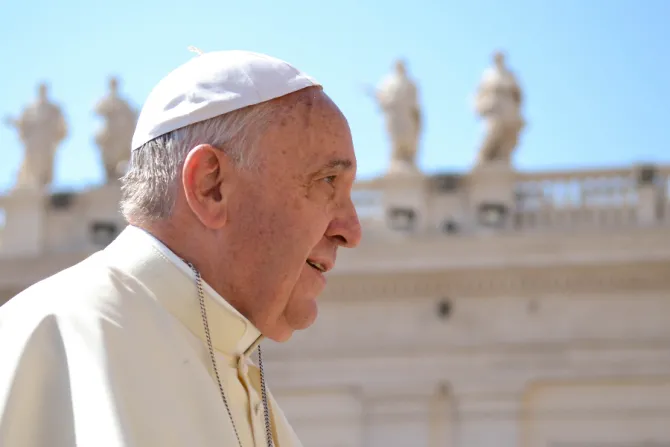Pope Francis greets pilgrims in St. Peter’s Square on June 4, 2014. | Daniel Ibáñez/CNA.
With the appointment of two secretaries at the Congregation for the Doctrine of the Faith and the confirmation of new leaders at the Dicastery for Promoting Integral Human Development, Pope Francis has embarked on a series of personnel changes before the new Vatican constitution comes into effect in June.
Published on March 19, the apostolic constitution Praedicate evangelium regulates the tasks and offices of the Roman Curia. Almost nine years in the making, the document will enter into force on June 5.
That day, the Vatican’s departments will change their names and some will take on new competencies, while certain new rules and regulations will formally take effect. For example, priests will no longer be able to serve in the Curia for more than two five-year terms.
The overall reform was, however, anticipated by several decisions taken by Pope Francis. There were two important ones in recent months.
The first was the restructuring of the Congregation for the Doctrine of the Faith (CDF), which is now divided into two sections, one disciplinary and the other doctrinal.
The second was Pope Francis’ decision not to renew Cardinal Peter Turkson’s term as prefect of the Dicastery for Promoting Integral Human Development.
From the beginning of this year, Cardinal Michael Czerny has served as the dicastery’s interim president. He was formerly the undersecretary for the department’s migrants and refugees section. The interim secretary was Sister Alessandra Smerilli, who arrived at the dicastery as an undersecretary in 2021.
Regarding the CDF, Pope Francis has chosen the new secretaries according to both continuity and novelty.
The continuity is in the disciplinary section: Msgr. John Joseph Kennedy, who has served at the CDF since 2003 and led the office of the congregation’s disciplinary section since 2017.
The novelty is in the doctrinal section: the secretary is Msgr. Armando Matteo, who arrived at the CDF in 2021 as deputy undersecretary and quickly made inroads into Pope Francis’ heart. Indeed, the pope presented members of the Curia with a copy of Matteo’s book “Converting Peter Pan” during his traditional pre-Christmas address.
The lack of a promotion for Msgr. Matteo Visioli, the current undersecretary of the CDF, is surprising. In any case, the new organizational chart paves the way for the appointment of a new CDF prefect, given that Cardinal Luis Ladaria has already turned 78 and is three years over the retirement limit of 75.
It is said that the new prefect could be Archbishop Charles Scicluna, the archbishop of Malta and the CDF’s adjunct secretary. But that, of course, remains to be seen.
The announcement of the two new secretaries was not accompanied by an episcopal appointment, which is also a sign of the new course at the Vatican. Since according to the vision of Praedicate evangelium authority is given by the mission and not by episcopal ordination, there is no longer a need for senior officials in Roman dicasteries to be named bishops.
Sister Alessandra Smerilli, now number two of the Dicastery for Promoting Integral Human Development, is obviously not a bishop either.
The dicastery is now firmly in the hands of those who have overseen its migrants and refugees section. The section was established by Pope Francis within the dicastery in 2016 and answerable directly to the pope, but it is not even mentioned in Praedicate evangelium.
The dicastery will now be led by Cardinal Michael Czerny, a Jesuit who oversaw the migrants and refugees section. Father Fabio Baggio, who served from 2017 as co-undersecretary of the section, was appointed this month as undersecretary of the dicastery (with responsibility for the migrants and refugees section).
Therefore, the issue of migration is now central to the dicastery, which, under the umbrella of integral human development had brought together four pontifical councils: Justice and Peace, Migrants, Healthcare Workers, and Cor Unum (the dicastery of charity).
This shift was made clear from a statement issued by Czerny when he was named as the dicastery’s interim leader. He said that the dicastery faced numerous pressing challenges in a world that prioritized “the globalization of indifference” over solidarity while trampling on humanity’s common home and the universality of the human family.
The cardinal added that “the good work carried out in the migrants and refugees section of the dicastery offers itself today as a fruitful approach to the challenges just mentioned.”
In the coming months, the heads of other dicasteries are expected to be appointed, which could lead to the departure of several long-serving curial cardinals.
Cardinal Gianfranco Ravasi, the 79-year-old president of the Pontifical Council for Culture, will undoubtedly leave. The pontifical council will become part of the new Dicastery for Culture and Education, but the current prefect of the Congregation for Education, Cardinal Giuseppe Versaldi, is also over 75. There is talk of Cardinal Jean-Claude Hollerich as a possible candidate for the leadership of the dicastery.
Cardinal Marc Ouellet, prefect of the Congregation of Bishops, is already over the retirement age limit. So is Cardinal Leonardo Sandri, prefect of the Congregation for the Eastern Churches, but he could remain in the role, overseeing the newly named Dicastery for the Eastern Churches.
The new appointments are likely to lead to the creation of new cardinals. And it is not impossible that Pope Francis will do everything in June, as Praedicate evangelium comes into effect, leaving the changes as a legacy for his eventual successor.
Source: CNA

